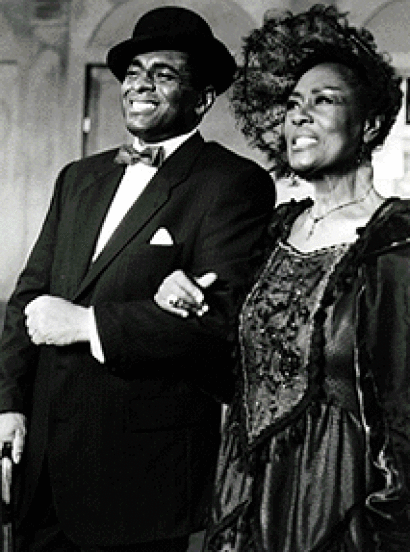November 15th: Today's Feature - In Dahomey: An all black cast Musical Comedy
- webbworks333
- Nov 15, 2025
- 6 min read
November
In Dahomey: An all black cast Musical Comedy is a landmark 1903 American musical comedy described by theatre historian Gerald Bordman as "the first full-length musical written and played by blacks to be performed at a major Broadway house." It features music by Will Marion Cook, book by Jesse A. Shipp, and lyrics by poet Paul Laurence Dunbar. It was written by Jesse A. Shipp as a satire on the American Colonization Society's back-to-Africa movement of the earlier nineteenth century.
In Dahomey is regarded as a marquee turning point for African-American representation in vaudeville theatre. It opened on February 18, 1903, at the New York Theatre, starring George Walker and Bert Williams, two iconic figures of vaudeville entertainment at the time. The musical ran for 53 completed performances and had two tours in the United States and one tour of the United Kingdom. In total, In Dahomey ran for a combined four years.
Production history
Produced by McVon Hurtig and Harry Seamon, In Dahomey was the first to star African-American performers George Walker and Bert Williams, two of the leading comedians in America at the time. In Dahomey opened on February 18, 1903, at the New York Theatre, and closed on April 4, 1903 after 53 performances (then considered a successful run).
It had a tour in the United Kingdom, followed by a highly successful tour of the United States, which lasted a total of four years. It was the first American black musical to be performed abroad.
The musical was revived on Broadway, opening at the Grand Opera House on August 27, 1904 and closing on September 10, 1904 after 17 performances. Bert Williams (as Shylock Homestead), George Walker (as Rareback Pinkerton) and Aida Overton Walker (as Rosetta Lightfoot) reprised their roles.

Tours in England and America
The poster announcing the London premiere of In Dahomey at the Shaftesbury Theatre, 1903. The poster features the famous cake walk with Bert Williams, acclaimed comedian, at the top of the cake.
Based on the show's New York success, the producers of In Dahomey transferred the entire production to England on April 28, 1903, with a staging at the Shaftesbury Theatre, followed by a provincial tour around England. This was capped by a command performance celebrating the ninth birthday of the eldest son of the Prince of Wales at Buckingham Palace. In Dahomey was heralded as "the most popular musical show in London.”
After a year touring England and Scotland, In Dahomey returned to New York. It reopened on August 27, 1904, at the Grand Opera House. This was followed by a major 40-week tour across the United States. It played such cities as San Francisco, California; Portland, Oregon; and St. Louis, Missouri; turning in a profit of $64,000.
Themes
Vaudeville performers Bert Williams (left) and George Walker in blackface and comic outfits.

Featuring the renowned comic pair of Bert Williams and George W. Walker, the show was the first to introduce a critical discourse of African Imperialism into the vaudeville theatre scene.
Walker and Williams were said to have emphasized some of the most important components of early 20th-century Black musicals: fast-changing scenery using tableau (presumably painted backdrops), improvisation, traditional Black-facing, heavy pantomime, and interpolation of songs borrowed from other original source-texts.
Synopsis
The story tells of two conmen from Boston who, having found a pot of gold, devise a plan to move to Africa to colonize Dahomey (present-day Benin) with a group of poor American blacks. Having suffered bad luck, the conmen, Shylock Homestead (played by Bert Williams) and Rareback Pinkerton (George Walker) are sent to Florida to con Cicero Lightfoot (Pete Hampton), the president of a colonization society.
To his surprise, Pinkerton learns that Homestead is rich, and arranges to become his trustee to gain access to Homestead's wealth. Once having been successful with that, Pinkerton struts around, acting as a dandy, or a refined figure in black society. Upon realizing Pinkerton's schemes, Homestead refuses to continue to support Pinkerton's acts, and the show culminates with a spectacular cakewalk.
In other sources, In Dahomey is described as following the attempts of two con men (played by Bert Williams and George Walker) charged with recovering a lost heirloom to be flipped for profit. The search for the heirloom crosses paths with a colonization society that intends to settle pioneers in Dahomey. The plot of the original source-text differs, according to many sources, but all agree there were three primary locales in In Dahomey: Boston, Gatorville (Florida), and Dahomey.
A February 1903 New York Theatre program has been found that printed a synopsis that generally concurs with the scenes depicted in extant scripts. The recovered synopsis reads:

"An old Southern negro, Lightfoot by name, president of the Dahomey Colonization Society, loses a silver casket, which, to use his language, has a cat scratched on its back. He sends to Boston for detectives to search for the missing treasure. Shylock Homestead and Rareback Pinkerton (Williams and Walker), the detectives in the case, failing to find the casket at Gatorville, Florida, Lightfoot's home, accompany the colonists to Dahomey.
Previous to leaving Boston on their perilous mission, the detectives join a syndicate. In Dahomey, rum of any kind, when given as a present, is a sign of appreciation. Shylock and Rareback, having free access to the syndicate's stock of whiskey, present the King of Dahomey with three barrels of appreciation and in return are made Caboceers (Governors of a Province). In the meantime, the colonists, having had a misunderstanding with the King, are made prisoners.
Prisoners and criminals are executed on festival days, known in Dahomey as Customs Day. The new Caboceers, after supplying the King with his third barrel of appreciation whiskey), secure his consent to liberate the colonists after which an honor is conferred on Rareback and Shylock, which causes them to decide "There's No Place Like Home.”"
Importance
In Dahomey marked an important milestone in the evolution of the American musical comedy. Its composer Will Marion Cook combined the "high operetta style" he had studied with the relatively new form of ragtime in the finale "The Czar of Dixie". According to John Graziano, author of Black Theatre USA, it was "the first African American show.
The score made use of the "high operetta style" that synthesized successfully the various genres of American musical theatre popular at the beginning of the twentieth century—minstrelsy, vaudeville, comic opera, and musical comedy."
Significantly, the production of In Dahomey marked the first full-length African American musical to be staged in an indoor venue on Broadway, premiering at the New York Theatre on February 18, 1903. The earlier Clorindy was produced in 1898 at the Roof Garden of a Broadway theatre.
During its four-year tour, In Dahomey proved one of the most successful musical comedies of its era. The show helped make its composer, lyricist, and leading performers household names. In Dahomey was the first black musical to have its score published (albeit in the UK, not the US).
The play is thought to have marked a significant shift in black theatre performance. Limited by a demand for the comedy of ethnic and racial stereotypes— particularly black stereotypes as depicted through minstrel performance— African-American performers were restricted largely to perform variations of the "darky" and Chinese people as caricatures.
While still featuring such racial caricatures, In Dahomey simultaneously builds on depictions of black characters. It creates a significant alternative to the dominant representations of blacks in the theatre during its era.

As the first show with an entirely African-American cast, In Dahomey is said to have been met with hostility from some. One New York Times report mentioned "troublemakers" who had warned for the play being the initiation of a potential race war, stressing in its mostly positive review that "the Negroes were in heaven". The play ran for the whole season with considerable success and without incidents. After 59 performances, the troupe was invited to play in London for six weeks, touring England and France for a couple of months after that.
Music
In Dahomey captures much of the perspective of early 20th-century Broadway. Many songs feature classic vaudevillian elements and dramatic flexibility. Fewer than a half-dozen songs were topically linear to In Dahomey's driving narrative. Only two songs, "My Dahomian Queen" and "On Broadway in Dahomey Bye and Bye", refer to the locations and plot integration.
Many songs, such as "Brown-Skin Baby Mine", "My Castle on the Nile", "Evah Dahkey Is a King", "When It's All Goin' Out and Nothin' Comin In", and "Good Evenin'", have been performed in other vaudevillian Broadway shows.


















